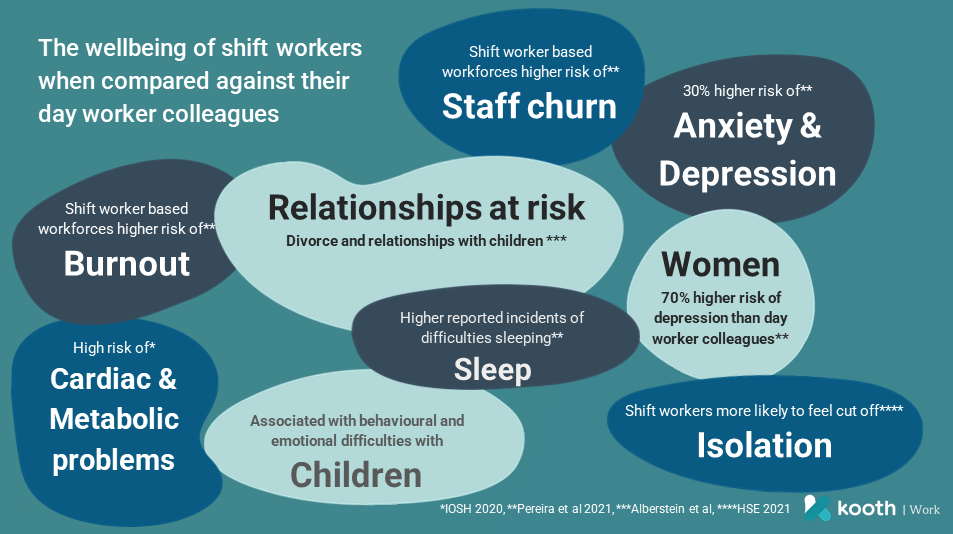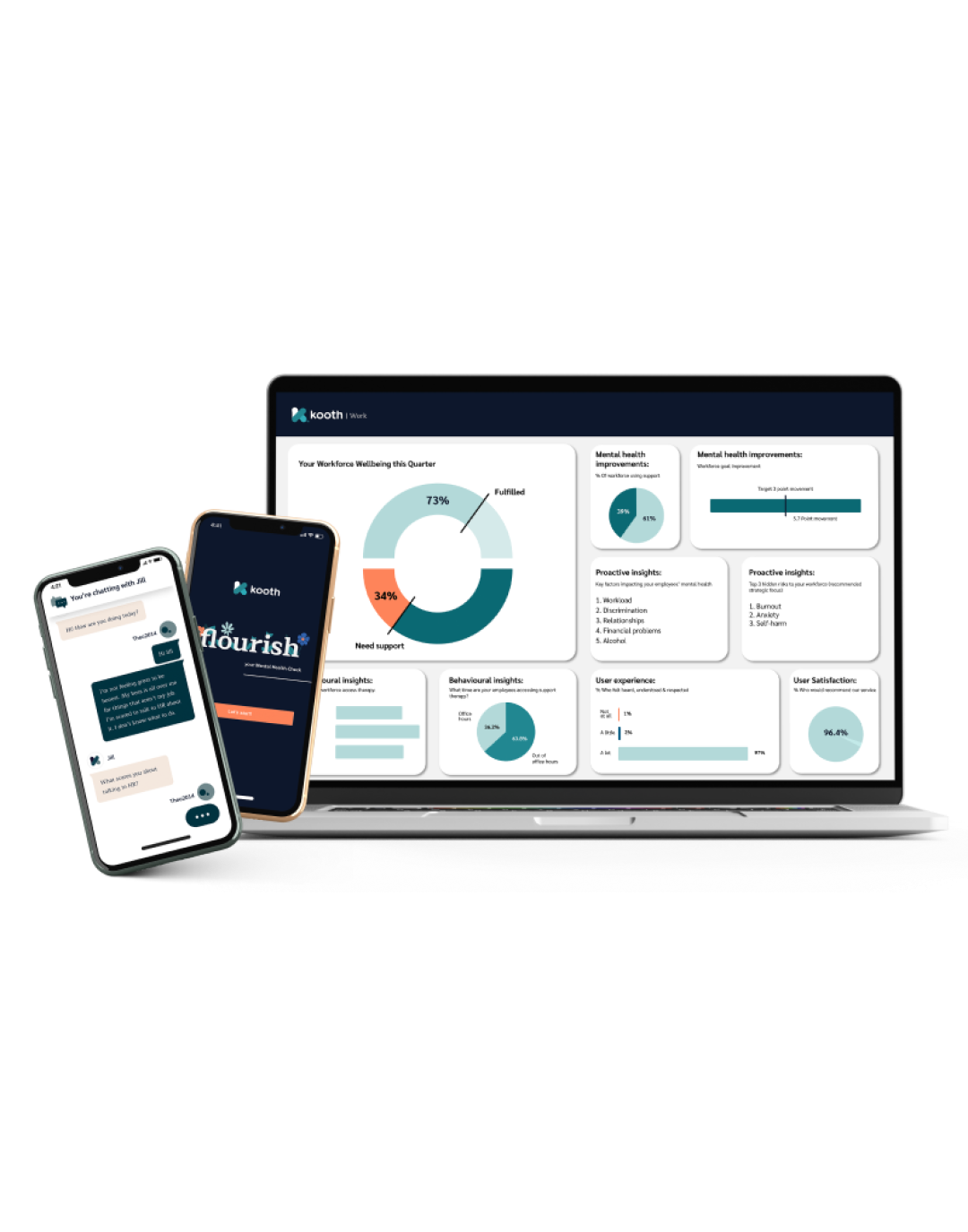Research into the impact of shift work on workforce mental health and wellbeing and reports by IOSH and the HSE indicate that shift workers, especially night shift workers, are more likely to struggle with their mental health. They are also more at risk of cardiac and metabolic problems.
Further to Kooth Work’s key presentation on shift work and worker mental health at this year’s Emergency Services Show with wellbeing representatives from the ambulance and police services, this article shares a conversation with users of Qwell, Kooth Work's employee support platform, where they discuss what it’s like to work night shifts.
Kooth Work talks with night shift workers Caroline and JessicaWorking long shifts during unsociable hours can easily take a toll on your sleep, social life, and overall mental health. We spoke to two best friends, Caroline and Jessica*, about their experiences working 12-hour night shifts as nurses and their tips for managing an unnatural schedule.
Working long shifts during unsociable hours can easily take a toll on your sleep, social life, and overall mental health. We spoke to two best friends, Caroline and Jessica*, about how working 12-hour night shifts as nurses affected their lives, how they made changes, and their tips to help manage an unnatural schedule.
*These names are pseudonyms.
The difficulties of working night shifts
While it may seem obvious that working night shifts impacts your sleep, Caroline and Jessica explain how that disruption of sleep can easily bleed into other important aspects of life, making it difficult to manage your mental health and wellbeing.
Caroline says, “With night shifts, you’re not sleeping on a normal schedule, so you’re not on your normal circadian rhythm*. You’re body’s already confused from that. Then, on top of that, you have to change your eating schedule.
*Circadian rhythm is your natural 24-hour body clock that regulates your sleep and wake cycle.
“There are a lot of days where you get off of a shift and you can't sleep. Sometimes you're staying up for 48 hours and then you'll go into periods where you just sleep for 24 hours straight, so you can't really have a good social life. Even when you are awake, you don't feel like yourself. You just feel like you're sleep-hungover.”
Jessica adds, “Sleep, eating, and basic human things become difficult. I mean, a lot of people say that if you do it long enough then it becomes the norm, but it's still not natural for your body. Working nights, I just felt consistantly exhausted.
“It was so confusing for me to go from one day to the next while at work. You try and sleep during the day, but I have sleep anxiety*, so it's really difficult for me to sleep when I know the world's happening outside. I had long periods of not sleeping because things were happening with my family and I wanted to be with them.”
*Sleep anxiety refers to fear or worry about falling asleep or staying asleep. It can be caused by many different factors.
It can be challenging to return to a normal schedule after working nights. Caroline says, “It took me forever to get back onto a normal sleeping and eating schedule. Making myself follow a schedule became really hard because it didn’t make sense to my body anymore.”

The wellbeing of shift workers when compared against their day worker colleagues
Jessica’s tips for balancing night shifts and wellbeing
1. Learn to prioritise sleep - even at odd hours.
“When I first worked night shifts, I didn’t prioritise sleeping because it wasn’t during normal sleeping hours - but sleep is so important! Going back to night shifts, I’m definitely going to have a more regular sleep pattern and try to prioritise that over everything else. It’s hard because it’s light out, but blackout curtains are super helpful.”
When you’re working night shifts, it’s likely that you don’t practice your normal sleep routines, but it can be helpful to try to find new ones.
2. Find an eating schedule that works for you.
It can feel unnatural to eat full meals late into the night, but it’s important you find an eating schedule that suits you. Jessica says, “It's important to eat. I’d try to eat before I’d go to work and then I’d try to eat around midnight. Otherwise, I’d just snack all night or get really nauseous and not feel like eating at all.”
3. Limit caffeine intake.
Caroline and Jessica spoke about how common it is for nurses to develop a reliance on caffeine to help stay alert during unsociable hours. Jessica says, “I limit my caffeine after 3 AM so it’s easier to go to sleep.”
Caffeine is a stimulant, meaning it speeds up the communication between your body and brain. Caffeine can make you feel more alert, but can also increase anxiety and disrupt your sleep cycle.
Recognising when working nights is not sustainable
While there are often financial benefits to working nights, and sometimes these shifts are the only ones available, it’s important to evaluate whether working nights is sustainable for you over a longer period of time. Jessica switched to day shifts after realising it was unsafe for her to drive a long commute home after 12-hour night shifts. Recently, she has found a job close to home and decided it would be manageable for her to return to working nights.
On the other hand, Caroline decided to find a job where she didn’t have to work nights. She says, “Now, I avoid night shifts because it was just not good for my wellbeing between the mental health stuff and the bad social schedule. It was not for me. You’d hit 2 AM and be like, ‘Okay, this isn't that bad,’ but then an hour or two later, you're struggling. It's hard. But then there are a few people who adjusted well to it and have been doing it for years.”
The benefits of shift work
With some learning and adjustments, shift work has become something that suits Caroline and Jessica’s lifestyles. Jessica says, “I prefer shift work. I work three twelve-hour shifts a week. I feel like it gives me that balance where I can be with my family and have the opportunity to have those peaceful days when I can recharge. The long, long shifts do take it out of me, and especially night shifts were really rough, but I prefer working longer shifts for fewer days. I can’t imagine working a nine-to-five job at this point.”
Finding help
If you have employees who work night shifts and are struggling with their mental health while working long shifts or unsociable hours, it can help them to know they are not alone. If they’d like to speak to a Qwell mental health practitioner, they can get anonymous support on our Qwell employee support platform by sending a message or having a live chat with a mental health practitioner or counsellor.
If you are a wellbeing leader and would like to make BACP-accredited professional mental health support and counselling easily available to all your employees, along with reporting insights to help build a data and clinical led prevention mental wellbeing strategy, then please ask about our Kooth Work packages.






